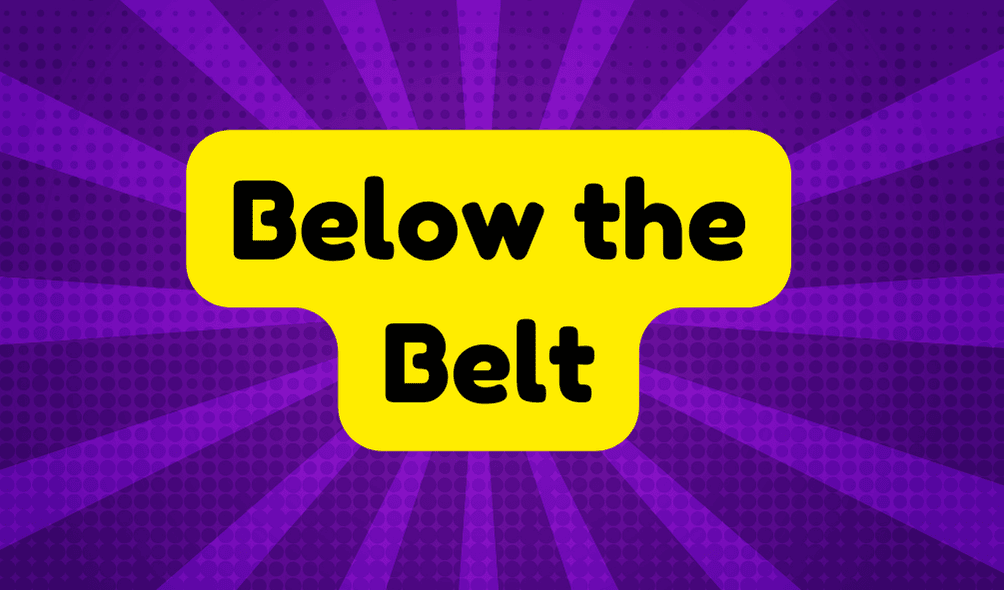The term "below the belt" describes unfair or dishonorable actions, originating from boxing where hitting below the waist is prohibited. This expression now applies to various social situations, indicating manipulative or unethical tactics. For instance, in political debates, candidates might use slanderous remarks instead of discussing policies. Such behavior reflects a decline in integrity and respect. Understanding this concept can shed light on social interactions and highlight the importance of fair practices in communication. More examples await exploration.
Synonyms
Synonyms for the phrase "below the belt" are varied, each capturing aspects of dishonorable behavior and unfair tactics. This language is essential in understanding the implications of cruel competition. Often, these terms conjure images of actions that lack integrity, fostering mistrust in relationships. Notable synonyms include:
- Unprincipled behavior
- Dishonorable conduct
- Deceptive tactics
- Unfair means
Such terminology sheds light on societal standards regarding fair play. Engaging in unfair tactics not only detracts from competition but also diminishes one's credibility. Consequently, recognizing these synonyms serves as a reminder of the importance of integrity in both personal and professional contexts.
Example of Sentences
The concept of engaging in behavior deemed "below the belt" can be exemplified through a variety of real-world situations. Such examples of usage reveal the prevalence of unfair tactics in different arenas:
- During heated sports debates where players insult each other's families.
- In workplace confrontations, when colleagues undermine each other's credibility.
- Social exchanges where personal attacks overshadow meaningful dialogue.
- Political campaigns that rely on slander rather than constructive policy discussion.
These instances illustrate that resorting to below-the-belt tactics diminishes integrity and often leads to volatile and unproductive outcomes. Understanding these examples helps emphasize the importance of fairness and respect in all interactions.
Origin
Originating from the world of boxing and formal combat sports, the phrase "below the belt" has evolved considerably over time. Initially rooted in boxing terminology, it referred to hitting an opponent in a sensitive area, deemed socially unacceptable. This concept gradually expanded beyond physical conflicts to encompass various social dynamics, highlighting unfair tactics in arguments or interactions. Such a transformation underscores the pressing need for honor and fairness, not just in sports but also in societal exchanges. As its usage broadened, the term became a metaphor for actions considered unjust and lacking integrity, resonating throughout contemporary discussions in different contexts.
Collocations
Collocations related to the phrase "below the belt" reveal its pervasive nature in language and behavior. They emphasize the violation of sportsmanship ethics and fair competition principles, highlighting unfair tactics in various contexts. Some notable collocations include:
- Below-the-belt tactics in debates
- Below-the-belt remarks in discussions
- Below-the-belt strategies in negotiations
- Below-the-belt moves in sports
These expressions underscore a shared understanding that actions stifling fairness contribute to a toxic environment. Recognizing these collocations fosters a critical perspective toward behavior that undermines integrity and decency, reinforcing the importance of maintaining respectful interactions and upholding ethical standards.
How to Use in Everyday Language
Fairness is a cornerstone of effective communication and competition, yet the phrase "below the belt" serves as a stark reminder of how easily this principle can be violated. In daily encounters, individuals must recognize appropriate contexts for using this expression. It can highlight unfair tactics in discussions, whether in personal arguments, political debates, or workplace conflicts. By employing this phrase, one can call out unjust behavior and encourage ethical engagement. Awareness of when and how to use "below the belt" can enhance conversations, prompting reflection on fairness while fostering a more respectful atmosphere amidst differences of opinion.
Why Is It Still Relevant Today?
The phrase "below the belt" endures in modern discourse as a reflection of ongoing societal challenges regarding fairness and integrity. In today's landscape, where unfair tactics often surface in politics, business, and personal relationships, the term serves as a reminder of the importance of respect and ethics. Social dynamics are increasingly influenced by such tactics, as they can erode trust and cooperation among individuals and groups. Recognizing when interactions turn "below the belt" encourages a closer examination of motives and behaviors, fostering healthier communication. Consequently, this phrase remains relevant as society grapples with issues of honesty and honor in contention.







